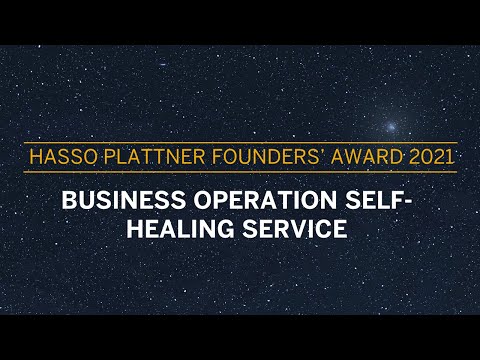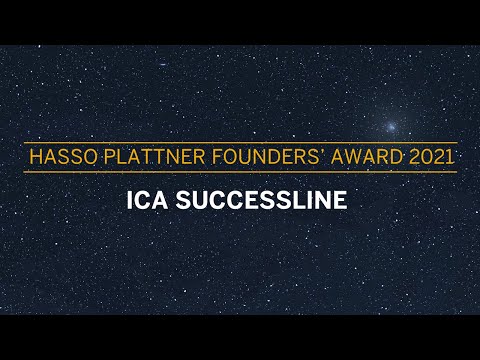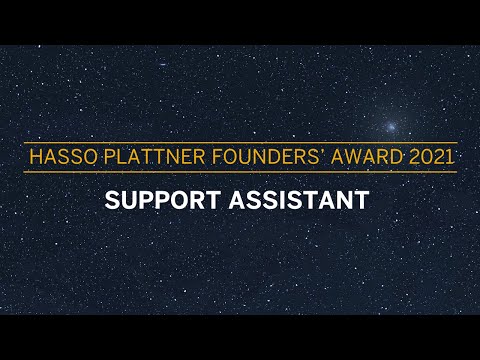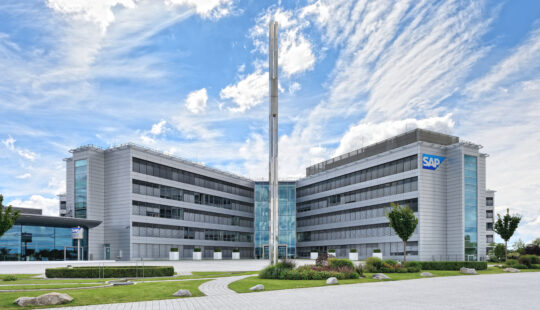Nine teams across three categories are vying for this year’s Hasso Plattner Founders’ Award. Each category reflects a different type of breakthrough thinking, considering the various ways in which innovation drives SAP’s success.
Here, meet the finalists in the Go-to-Market category.
The Hasso Plattner Founders’ Award is the highest
employee recognition at SAP, awarded annually by the CEO
to an individual or a team.
Finalist: Business Operation Self-Healing
“A world where AI is an integral part of day-to-day business operations, where we learn from every interaction and data point to improve business systems.” This is the vision of Glenn Svensson and his team. And with implementing their innovation – Business Operation Self-Healing (BOSH) – they want to take a step toward realizing this vision.

Video produced by Rana Hamzakadi and David Aguirre
It all started as a research project for the SAP Executive Board, exploring the broader context of artificial intelligence (AI) in businesses. In the process, the team quickly discovered they could “do way more with AI than anticipated,” Svensson remembers. As business operations become more complex, automated solutions are crucial to supporting the best customer experiences.
According to the team, their digital innovation can identify and fix issues, address performance variations, and restore outages without human intervention, which is time-consuming and prone to error. At the same time, it is helping business users, service desks, and IT professionals work more efficiently. “Gone are the days of submitting a help desk ticket and waiting for a member of the IT team to intervene when a system incident occurs,” Svensson says.
BOSH is an automation engine build on AI that is capable of understanding human-machine interactions and has contextual awareness. Based on these capabilities, BOSH can resolve customers’ operational issues all by itself. With BOSH, high-volume complex issues can be solved in minutes – even seconds – rather than hours.
Built on SAP Business Technology Platform (SAP BTP), it combines a broad set of services. “We have some amazing platform services in SAP BTP,” Svensson says. “We took these and elevated them into something inventive and unique that brings tremendous value to our customers.”
The team built more than 80 high-value, ready-to-use resolutions addressing common customer issues. BOSH also has more than 500 conversational skills, allowing faster and better routing of issues to the right department, leading to faster resolutions and the best possible customer experience.
This customer-first approach is the fundamental motivation for the whole team: “We originated in the Customer Success organization, so our background was solidly in the customer-facing side of the company,” Svensson says.
Transformational Moment in User Experience
Svensson and his team are confident that BOSH will drive the adoption of AI in day-to-day business and offer a huge impact on customers. “We have observed that self-healing services settle issues in a fraction of the time and improve the user experience dramatically,” he says.
With their innovation, the finalist team wants to bring hyperautomation closer to customers and demonstrate that AI can play a secure and transparent role in their businesses.
Finalist Fast Facts
- Submission Title: Business Operations Self-Healing Service (BOSH)
- Team: Glenn Svensson, Andy Lawrence, Mark Cooling, Eoghan Murphy
- Number of Employees: More than 40 with core team, other colleagues, fellows, delivery colleagues, and interns
- Achievement: BOSH has gone live at HPE, SAP, and other large blue-chip companies around the world. It offers over 80 ready-to-use resolutions and more than 500 conversational skills.
- Impact: As market makers in the hyperautomation space, BOSH demonstrates to customers that AI can safely and transparently take a role in their organizations. The solution covers sales, HR, procurement, and IT, and crosses lines of business. BOSH is leading the acceptance of AI in day-to-day business in a human-centric approach. All this can be delivered in less than four weeks to customers.
Finalist: SuccessLine
How can SAP bring teams from the Customer Success organization together to better support customers’ moves to software-as-a-service offerings and accelerate their value realization in the cloud? Questions like these drove the Industries and Customer Advisory (ICA) team to develop SuccessLine, a tool that brings proven best practices to Customer Success organization teams worldwide.

Video produced by Rana Hamzakadi and David Aguirre
SuccessLine is a tool that helps teams plan, collaborate, and execute complex customer engagements. With their innovation, the finalist team delivers a solution that can drive customer engagements with a cloud-first mindset.
SuccessLine guides teams through the entire customer journey. For each step, it links to the most up-to-date go-to-market best practices, including the latest SAP innovations, such as SAP solutions for sustainability offerings, and puts them into a customer context. For each recommended activity, SucccessLine proposes references, best-in-class examples, and contacts to help teams position the right value to the customer.
“For example, the global RISE with SAP template guides the teams to the digital discovery assessment process to effectively position RISE with SAP,” explains Jeff Tanner, global director from the Industries and Customer Advisory team at SAP. At the same time, the tool enables teams around the world to join forces and collaborate visually with one another.
Creating Alignment, Transparency, Simplicity
Throughout the process, the entire customer journey can be shared with colleagues from the Customer Engagement & Experience organization as well as partner teams, helping to facilitate a smoother handover and full transparency of the customer engagement.
“There is no other solution available to our Customer Success teams that can create the alignment, transparency, and simplicity that SuccessLine delivers,” Tanner says.
SuccessLine was initially developed and tested as a prototype in the EMEA North region. Following a successful global pilot in 65% of SAP regions, SuccessLine is planned to be rolled out worldwide in 2022 and for availability to more than 5,000 field employees in the first quarter of 2022.
For Tanner, the current global reach will benefit Customer Success teams everywhere. However, he stresses that the impact of SuccessLine will be measured not only by its adoption, but also by how it helps the field transform customer discussions. He is confident that SuccessLine has the potential to reshape the way field teams collaborate, help them deliver value to SAP customers, and ultimately accelerate both SAP’s and its customers’ transitions to the cloud.
“One of the most important jobs we have is helping our customers move to the cloud. SuccessLine empowers teams to position the latest cloud solutions and enables our customers’ reinvention in the cloud,” Tanner says.
Finalist Fast Facts
- Submission Title: SuccessLine by Industries and Customer Advisory
- Team: Geff Gilligan, Richard Abbiss, Ummar Rasheed, Ilda Freitas, Mieke de Rooij, Thomas Scaysbrook, Henry Himanen, Ken Crovetti, Jeff Tanner, Phil Davies
- Number of Employees: 10
- Achievement: An innovative, best practice delivery and collaboration platform to drive customer value realization
- Impact: Available soon to more than 5,000 field employees in the Customer Success organization, SuccessLine will transform customer discussions – measured by improved customer NPS, cloud adoption, and renewal rates.
Finalist: Support Assistant
Fast reactions and providing solutions are key when it comes to creating positive customer experiences. To prevent customer support cases from piling up in the queue and longer wait times, Jonathan Wiens and his team set a goal of connecting customers directly to solutions to further reduce the time needed to resolve customer support cases. An idea was born: a tool that enables customers to find their solutions easily without the need for a support engineer to walk them through it.

Video produced by Rana Hamzakadi and David Aguirre
The team introduced Support Assistant, a cloud-based application that uses automation and machine learning to maximize customer satisfaction and minimize time-consuming manual work. With this innovation, customer teams are better able to handle an increasing number of support cases with the same amount of resources while supporting high customer satisfaction throughout the process.
Wiens, lead developer, explains: “The Support Assistant takes our most valuable asset — the expertly combined knowledge of our engineers — and makes recommendations in a single tool for all customers to easily interrogate and resolve their issues.”
Guiding Customers from Problem to Solution Automatically
To narrow down their problem area when reporting an issue, customers are guided through a conversational user interface where the Support Assistant automates the most common and repeatable questions. Wiens explains that with each response the customer provides, Support Assistant uses machine learning to recommend expert content such as SAP Knowledge Base Articles, SAP Notes, SAP Community posts, or wikis. By presenting customers with possible solutions before they even need to connect with a human, the case submission process is simplified and the Support Assistant guides them from problem description to solution automatically.
“The Support Assistant enables our customers to access knowledge repositories with ease, so they are empowered to act on solutions quickly and on their own,” Wiens summarizes.
If the support of an engineer is needed, the previous conversation thread is aggregated into a comprehensive case description that can be shared with the human engineer. As a result, follow-up questions by the support provider can be minimized, leading to a reduced customer effort. This way, both customers and engineers can rely on the Support Assistant to increase the speed with which support organizations can react to them.
The results speak for themselves: the Support Assistant is used daily, with more than 100,000 visitors on SAP Support Portal per day. Wiens shares that the Support Assistant was used 65,000 times in 2021, leading to tens of thousands fewer support cases requiring help from a human support engineer.
Wiens and his team are confident in the benefits of Support Assistant: “It is more vital than ever before to ensure we are No. 1 in customer satisfaction, especially when our customers consider cloud solutions. Support Assistant is helping us get there.”
Finalist Fast Facts
- Submission Title: Support Assistant: Delighting Customers by Solving Issues Faster
- Team: James Chaplin, Lisa Lewis, Vincent Judge, Mike Griffiths, Sean MacNiven, Peter Rigo, Jonathan Wiens, Marcel Pinheiro, Christine Osborn, Lucas Viana
- Number of employees: 10
- Achievement: A team of product support engineers came together to design, build, and release an innovative customer-facing solution that guides customers to resolve their own product issues through interactively asking product- and problem-specific questions and matching them to the perfect solution.
- Impact: With more than 100,000 visitors to SAP Support Portal every day, the Support Assistant reaches customers on a daily basis, as it is now available for 90% of all customer cases raised (excluding SAP Ariba, SAP Fieldglass, and SAP Concur). In 2021, SAP customers have used Support Assistant 65,000 times to find their solution, which means fewer cases in the support queue that require help from a support engineer. Happier customers renew their maintenance and continue paying their subscription, helping drive revenue for SAP.



